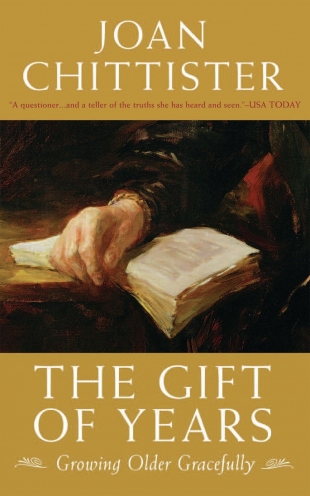" 'No one was ever so completely skilled in the conduct of life,' Jonathan Swift said, 'as not to receive new information from age and experience.'
"What is the major difference between us and other countries around the world? There are multiple ways to answer the question, of course, but there is one indicator of social difference that may be even more telling than the standard political or economic indices — and that is the age level of the population. In the United States now, the median age of the population is thirty-six. In many parts of the world, it is twenty-five — or younger.
"The United States, in other words, is a graying population.
"But not graying only. We are also thriving. By the year 2030, for the first time in history, the number of those under seventeen and those over sixty-five will be almost equal. Children are living through infancy and adults are living well into old age. In 1900, forty percent of the population was under seventeen, and only four percent was over sixty-five. Not now. Not here. Over ten percent of the population — thirty-three million Americans — is now sixty-five and older. By 2030 that number is expected to have more than doubled, to nearly seventy million.
"That is important in a lot of ways, of course. It explains the changing demands for hospitals, for senior-citizen complexes, and for intergenerational communities. It also signals the growing political power of a generation that soon will make up twenty-five percent of the voting-age population of the entire country. It will affect what companies produce in years to come and to what portion of the society they will appeal. We can already see the shift in TV commercials from the emphasis on sports equipment twenty-five years ago to health food products now. We're even advertising our funeral plans now in order 'not to burden our children' — most of whom may well not even be living near us as we age.
"Diminishment is no longer the principal characteristic of aging. On the contrary, we are now developing in ways that only a short time ago would have been considered impossible for anyone over the age of forty.
"Old age is no longer a custodial care proposition. Grandma does not 'live in' anymore. She is far more likely to live alone, in her own home or apartment, drive a car into her eighties, and volunteer at the local library.
"Diminishment is not what we're about — either in terms of numbers or of age.
"We eat better, live with less chance of physical disability, have sight and hearing aids, and participate in all levels of society for years. Not only are we the healthiest population of oldsters modern history has known, but we are the most active as well. And these trends are not just found in the industrial nations. As standards of living increase everywhere, so does the aging population of each region.
"But longevity is not the only indicator of the essential changes of age. Now we know that the brain, too — once thought to be irretrievably doomed to progressive senility as the years went by — continues to develop in new ways. It not only goes on producing new cells, but it also develops new ways of thinking.
"Scientists have discovered that older people, while not as quick computationally as younger people, do think just as well as the young, but differently — with more depth, with more reflection, with more philosophical awareness. Thought processes of the young compared with the thought processes of the older become the difference between the quickness of a computer game and the quality of a logician. The young produce ideas in rapid quantity, but often without form or figure. Older people might reflect on the very same data younger people do, but instead of manipulating it, tend to reduce it to concepts.
"These findings may confound younger generations who have been taught to fear their own old age, bur they place a new kind of responsibility, a new way of looking at the world on older people, too. There is no excuse now for simply dropping out of life. As long as we breathe we have a responsibility for the cocreation of the world, for the good of the human race.
"Old age is not a free ride to irresponsibility. Now we must take our place among the sages of the world, comparing, evaluating, cajoling, and bringing experience to bear as have the elders of every generation before us.
"Now, too, we have a responsibility to mentor the generations after us in the values and ideals that build a society based on equality, respect for others, and pluralism. More than that, we have the spiritual responsibility to see life as a moral force rather than simply a private enterprise.
"We need to come to understand to the center of our souls that age is not a disease. It is a new experience in how to live life, how to milk it dry of goodness, of energy, of gratitude, of calm and quiet creativity.
"The burden of a lack of commitment to accomplishment means that we have moved into a period of suspended animation, that aging is nothing more than deterioration. The truth is that aging means aging. Nothing more, nothing less. It is just us grown ripe.
"The blessing of a commitment to accomplishment is that, as we continue to bring our considerable skills, experience, and insight to bear on the present needs of humankind, we will certainly become wiser, definitely spiritually stronger, and more than ever a blessing to the rest of society."
